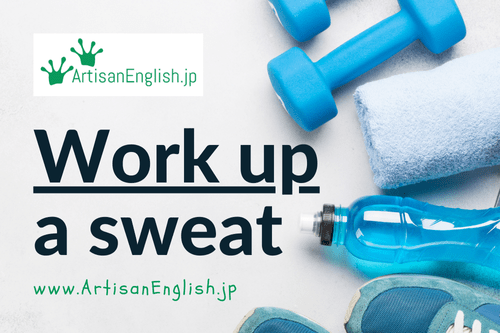
YouTube / iTunes / Spotify / Radio Public / Pocket Casts / Google Podcasts / Breaker / Overcast
Listen to ArtisanEnglish.jp posts & lesson intros here.
Word of the Day: Work up
I’m introducing a quite versatile phrasal verb this time – work up.
It has a few different meanings.
Generally, it means to develop or build up something, whether it’s energy, emotions, or even a physical condition.
One common usage of work up is when referring to emotions.
For example, you might say, “She worked up the courage to give an English speech in front of the class.”
In this case, work up means to gradually develop the courage needed for the task.
You can also work up energy doing something physically demanding.
For instance, “He worked up a sweat while jogging in the park.”
Here, it implies that he gradually increased his physical activity to the point where he began to sweat.
Another interesting way to use work up is in cooking.
You might say, “I need to work up a dinner recipe,”
This means you are developing and organizing a recipe to prepare a meal.
In discussions or debates, you could work up an argument.
For example, “They worked up a strong case for their proposal.”
This suggests they built up their reasons and evidence supporting their ideas.
Sometimes, work up can refer to physical sensations, such as, “I worked up an appetite after the long hike.”
This indicates that the physical activity led to feeling hungry.
On this note, as I am Canadian, I am working up quite an anger at Donald Trump.
Imagine the nerve to say that Canada should be the 51st state!
We won’t get into that now because I’d go off on a tangent.
I am working up a plan of defence just thinking about it.
See, I told you work up was a versatile phrasal verb, didn’t I?
Flesch-Kincaid Readability Test
This post is understandable by someone with at least an 8th-grade education (age 13 – 14).
On the Flesch-Kincaid reading-ease test, this post scores 68.
The easier a passage is to read, the higher the score on a scale of 0 – 100.

